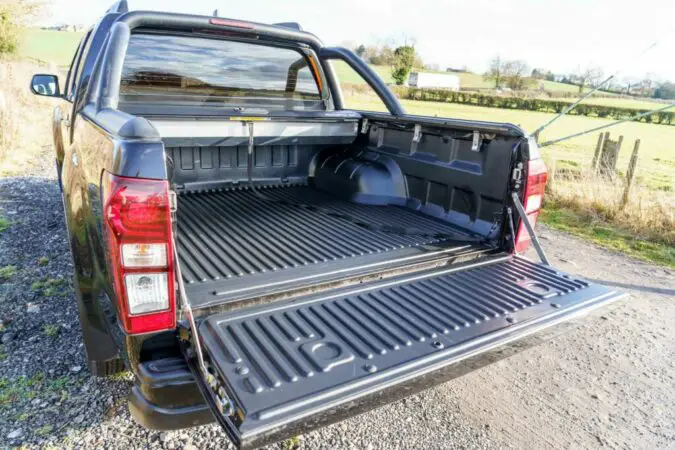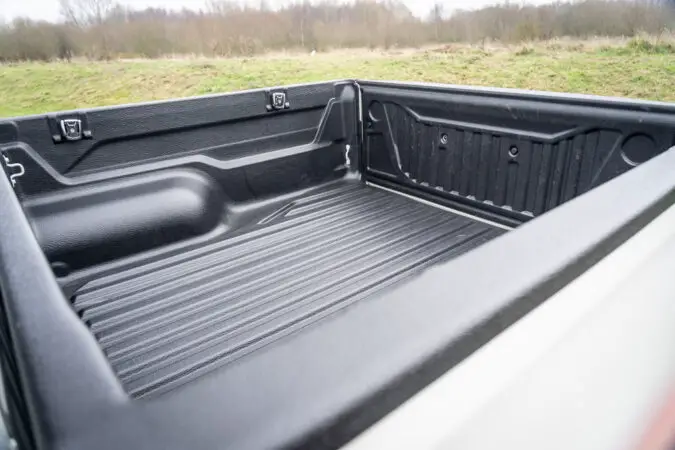Are you planning to load your truck and you are looking for a way to calculating GVW? Well, if that is the case and you are in this situation, then you are at the right place because there will be a lot to cover when it comes to this topic where we are going to learn everything you need to know.
- Why Weight Is Important?
- Curb Weight?
- Curb vs Gross
- Calculating Curb Weight
- Calculating GVW
- Payload Calculation
- Towing Calculation
- Conclusion
- F.A.Qs
Knowing the numbers is really one of the most important aspects when it comes to loading a car or a truck. Mainly because if you don’t stick to the allowed numbers you risk a lot of damage to be done to the chassis of the vehicle. As well as the engine and transmission.
This is why we heavily recommend that you do your own research and learn more about calculating GVW before you decide on loading the vehicle. But you shouldn’t worry much because in this article we are going to help you when it comes to calculating this stuff and help you determine what is the right weight for your vehicle. So, if you want to learn more about this keep up with us.
But first, we are going to learn why weight numbers are important to you, then we will learn what is curb weight and we will compare it with gross weight. Then we will discuss other topics like GVW vs GVWR and learn the differences between the two. Lastly, we will cover the calculating GVW for your car or truck. So, if you want to learn more, follow along.
Why Weight Numbers Are Important
Now before we dive into calculating GVW and other very important aspects of this, let’s take a look first at why these numbers are really important for you as a truck driver. Knowing this, that not only going to save your truck but it can also save lives. So, let’s cover this real quick.
If you didn’t know, a lot of car accidents that happen on the road in America are caused by vehicles that were overweight. So, what does this mean? Well, this means that their GVW was much more than the allowed GVW.
So, when this is the case, you can expect something really bad to happen and people to get hurt. In these situations, debris could fly off the truck.
If you didn’t know, between 2011 and 2014 there were about 125 deaths and more than 9,800 injuries annually. All these situations are caused by debris-related incidents. People just overload their trucks and they cause mayhem on the streets.
In addition to this, by overloading your truck you also risk damage to the frame, as well as damage to the suspension and engine, and transmission.
When under heavy load, all these components will take their toll, and eventually the frame could crack causing a catastrophic failure.
And what can happen is that this situation can occur while driving. So, imagine that you drive and something really bad happens and the whole truck simply crumbles because you overloaded it. This is why you need to know everything about calculating GVW. But more about that we are going to learn later on in the article. Now let’s take a look at what is curb weight.
Calculating GVW: What Is Curb Weight
Now that we understood why vehicle weight is really important, we can start moving on and learn more about certain topics before trying calculating GVW. And what are these topics?
Well, the first and most important thing that you need to know is the curb weight of a certain vehicle. We need to start with the basics and then move on and learn more complex stuff down the line. So, what is a curb weight?
Well, curb weight is the weight of the vehicle is something that is closest to the actual weight of a certain vehicle.
This is the weight of the vehicle without any load. But with a full tank of fuel and all the essential equipment.
This means that the curb weight does not include the weight of the passengers, optional equipment, and cargo.
Curb weight is not always important to know except in some cases when you plan to ship a vehicle on a carrier or possibly tow a vehicle behind another vehicle.
Here the curb weight plays a big role because it really helps the shipping companies to determine the overall weight of each item.
For example, if the cargo is shipped overseas, the crew of the ship has to know the weight of every cargo to determine when the ship has reached the limit of its loading capacity.
Because if they don’t do this, they risk having a ton of problems. This is why these numbers are really important. Because you don’t want to overload a ship and damage it in the process. But what about calculating GVW? More on that we are going to cover in a bit.
Curb Weight VS Gross Weight
Since we covered what is curb weight and learned more about it. Now before we start digging into calculating GVW, let’s take a look at the comparison between curb weight and gross weight.
In the previous chapter, we learned what is curb weight. And learned that this is the weight of the vehicle with a full tank of gas and without any passengers or cargo. But what is the gross weight? Well, that is a good question and we are going to elaborate more on this in this chapter and learn more about it. So, what is a gross weight?
Well, the gross weight is the curb weight of the vehicle. Plus the maximum payload that this vehicle was designed to carry.
So, the bigger the vehicle the bigger the difference between the curb weight and the gross weight. If for a small sedan the vehicle curb weight is 2,300lbs, the gross vehicle weight (GVW)would be 2,800lbs. This means that it has 500lbs extra that was designed from the factory for the cargo capacity.
While on the other hand when it comes to bigger vehicles like a truck. The difference would be very different.
So, if a curb weight of a Ford F-150 is about 5.684lbs, the GVW could go high as 7,050 lbs. So, you can see the difference when it comes to trucks. The GVW gets bigger and bigger.
The bigger and more capable the truck is, the bigger the GVW difference would be. So, for the F-250 the gross weight (GVW) can go up to 10,000lbs. You get the idea. But what about calculating GVW? We will get to that in a moment. Before we learn that let’s how you can calculate the curb weight of the vehicle. So, let’s get into it.
Calculating Curb Weight
Now as we learned more about the curb weight and gross weight before we learn how to do calculating on GVW, let’s move on and learn more about how to calculate the curb weight. So, how you can do this and calculate these numbers?
Well, it is actually quite easy to do and almost anyone that knows simple math can do the calculations and determine the curb weight of a vehicle. So, how it’s done? Let’s elaborate.
As you probably know, every vehicle has a sticker on the door jam on which the GVWR number is written. This is the gross vehicle weight rating as we mentioned.
This is the number that includes the curb weight plus the maximum payload weight that the vehicle can carry, also known as the cargo capacity. So, how you can do this calculation?
Well, it is a rather simple thing to do. What you can do is get the GVWR number and subtract from it the maximum payload that the vehicle can carry. You probably have the payload number written on the door jam as well.
So, get your calculator and do this calculation GVWR – Payload Capacity = Curb Weight. It is really simple to do.
As we mentioned previously, on small passenger cars, the difference should be rather small. About 500lbs. But as the vehicle class becomes bigger and bigger, there will be a lot of difference between the two.
So, whenever you try to calculate the curb weight just do this calculation. GVWR – Payload Capacity = Curb Weight. It’s that easy.
Fortunately, you will not need the curb weight and in most situations, you will only need the GVW and that’s what we are going to cover next before we do the calculating GVW.
Calculating GVW: What Is GVW
Now before we start learning more about calculating GVW, let’s take a look at what is GVW in general. This will be really useful for the people who were not reading the previous part of the article and have just jumped in. So, we will do a bit of repeating but it’s for a good cause. So, what is GVW?
Well, the GVW is an abbreviation that refers to the Gross Vehicle Weight. So, what is gross vehicle weight?
Well, we learned that the curb weight of the car is the weight with only the car itself plus a full tank of fuel. So, what is the GVW?
The GVW is simple the weight of the vehicle, plus the maximum payload capacity. Remember this, payload, not towing.
Towing is different and we are going to discuss towing numbers later on in the article. The GVW refers to the maximum weight that you can load on a vehicle on its bed or in the trunk as well as all the passengers included.
This is a really important number that you should be very interested in learning because if you overload a vehicle, you could cause an accident. Or possibly hurt somebody.
Not to forget that there could also be damage to the chassis of the truck and this damage could be quite significant and could basically write off the vehicle altogether. But where you can find the GVW number?
Well, the GVW number is usually found on the door jams. In most cases, on every vehicle, there are stickers that tell you all the official numbers. So, be aware of these things and make sure that you always follow the recommended numbers. But what about calculating GVW? More about that, in a bit.
GVW VS GVWR
Now before we start calculating GVW, let’s take a look at two terms that confuse a lot of people. And that is the topic of GVW vs GVWR.
Why are these confusing? Well, new people who just started into trucking often see these two terms used interchangeably. And they think that they mean different stuff.
But actually, they are not different at all. On most stickers, you will see the GVWR abbreviation on a sticker on a car. And in online slang, you can see the GVW only.
But this should not confuse you at all. Both of these abbreviations refer to the same stuff, which is the gross vehicle weight rating.
That’s why in the future, you shouldn’t be asking yourself questions and get confused over something really simple like this. So, once we cleared this out of our way, we can slowly move on to the main topic for today and that is calculating GVW.
And that is precisely the topic that we are going to discuss in the following chapter in great detail and learn more about how to calculate this stuff. So, let’s get into it.
Calculating GVW
Now let’s move on to the main topic and learn more about calculating GVW. Is there a way that you can try to calculate the GVW on a truck?
Well, not actually. The GVW of the vehicle is clearly stamped on the door pillar of the truck or car. As we mentioned previously this is the number that adds the curb weight of the vehicle and the maximum loading capacity.
So, this number is already pre-calculated for you and you shouldn’t do anything about it. The only thing you can do in this situation is to weigh the vehicle.
Usually, there are big truck scales that can weigh a whole truck. So, if you go over this type of scale and you measure a weight that is above the maximum GVWR, then your truck is overloaded and you have a problem.
In this situation what you want to calculate is not the GVWR but the payload capacity. And more on that we are going to explain next in the article. After that, we are going to explain the calculation for the towing capacity. And you don’t want to miss that.
Calculating GVW: Payload Capacity
Now since we learned that calculating GVW is not possible, let’s take a look at how you can calculate the payload capacity of a truck. First, we are going to learn the curb weight, and then we will subtract the curb weight from the GVW. So, how this is done? Let’s get into it.
The first thing that you will need to do in this case is learning about the curb weight. And for this purpose, you will have to consult with your owner’s manual or online resources. Or if you can find it on the door jam, that would be perfect.
Now let’s say that you learned about the curb weight and know how much it is. The next thing you would want to do is to subtract this weight from the GVWR weight which is the overall weight of the vehicle when loaded.
So, things go like this GVWR – Curb Weight = Payload Capacity. It is that simple. On smaller vehicles, the payload capacity will be smaller.
But the bigger the truck is, the bigger the difference will be between these two numbers which are the GVWR and the Curb weight. So, take note of this. So, we know about calculating GVW and payload. But how you can calculate the towing capacity? Let’s learn more about that next.
Calculating GVW: Towing Capacity
When it comes to estimating the towing capacity, things are getting much more complicated because you have another measurement which is the GCWR. So, what is the GCWR?
Well, the GCWR is the Gross Combined Weight Rating. This weight rating is taking into account the overall weight of the trailer that you are pulling as well as the addition and cargo of the passengers inside of the vehicle. But even though it might sound too complicated, it is quite easy to do.
Basically, it is the same as you calculating the payload capacity. You subtract the GVWR – The Curb Weight and you get the real number.
In this case, you do the same deal with the GCVWR. On the door jam, you also have this number as well. So, find the GCVWR and subtract the curb weight of the vehicle from it, then you will get the maximum towing capacity.
But remember that this weight does not include the passengers and cargo on the truck itself. So, here things are getting a bit more complex, and finding the right numbers can be rather difficult to do.
You will have to subtract the weight of the cargo that is on the truck from the towing numbers. You cannot learn exactly how much your cargo weighs unless you measure it, so you will have to rely on the rule of thumb when it comes to the cargo weight.
Once you subtracted the cargo, if there is any cargo on the truck including the passengers, you get the right number of how great is your towing capacity.
Net Weight VS Gross Weight
Another topic that we would want to cover which bothers a ton of people is the net weight vs gross weight. How do these two differentiate from one another? Let’s elaborate more in-depth.
So, let’s start first with the gross weight. What is gross weight? Well, when you ship something, it comes in a gross weight package. And this is the weight of the goods, plus the packaging. Cargo can be shipped in crates, pallets, etc. This is gross weight.
On the other hand, we have net weight. Net weight is a bit different in comparison to gross weight. Net weight only measures the weight of the objects that are shipped.
This is why if someone is sending you cargo of 2000lbs of gross weight it means that the weight of the whole cargo is 2000lbs. The net weight could be less because of the packaging.
So, whenever you want to order something you should look at the net weight of the object. Unless you want to lose a ton of money in the process. The difference between gross and net can be the profits that you will make reselling the goods later on. So, be very aware of these two terms if you want to be a trader. We learned about everything, including calculating GVW. Now let’s conclude this article.
Conclusion To Calculating GVW
In this article, we have covered quite a bit when it comes to the topic of calculating GVW. First, we learned what is curb weight and how you can calculate curb weight.
After that, we learned what is GVW and how you can do calculating GVW. We learned that this is not possible since this number is already pre-calculated from the factory. Lastly, we learned how to calculate payload, towing capability, and the difference between net and gross weight.
F.A.Qs To Calculating GVW
Now let’s answer some frequently asked questions.
What Is Curb Weight
Curb weight is a measurement of the weight of vehicles. Curb weight is the overall weight of the vehicle with a full tank of gas and only the standard equipment. Any extra weight such as passengers or cargo will not count anymore.
What Is GVWR
GVWR is the Gross Vehicle Weight Rating. Every vehicle has a GVWR number stamped on the sticker that is located on the B pillar. This is the maximum weight that this vehicle can handle. The curb weight plus the payload.
What Does GVWR Mean
This is the Gross Vehicle Weight Rating. Basically, this is the maximum weight that this vehicle can handle. Anything above this rating can be damaging to the vehicle’s structure.
What Is Payload Capacity
The payload capacity is the difference between the curb weight and the GVWR number. You subtract the curb weight from the gross weight also known as GVWR and you will find out how much cargo your vehicle can take.
What Is GCWR
GCWR is the Gross Combined Vehicle Weight Rating. This is basically the measurement that determines the weight of the trailer that you are pulling as well as the cargo and passenger weight.
What Is Gross Weight
Gross weight is the overall weight. This includes everything, the product and the packaging. Net weight on the other hand includes only the product itself.




